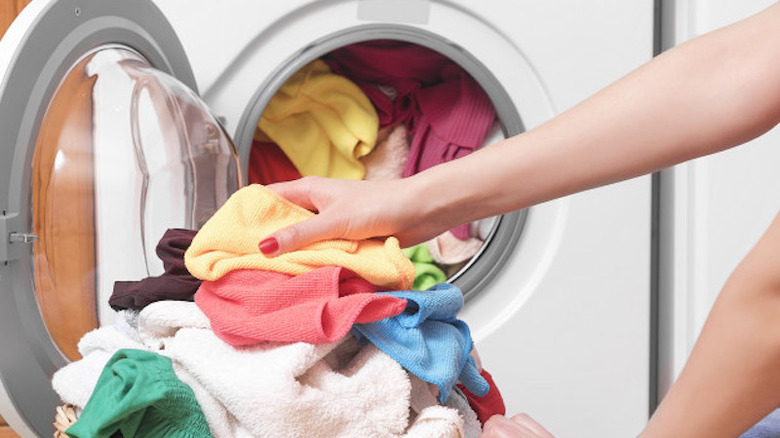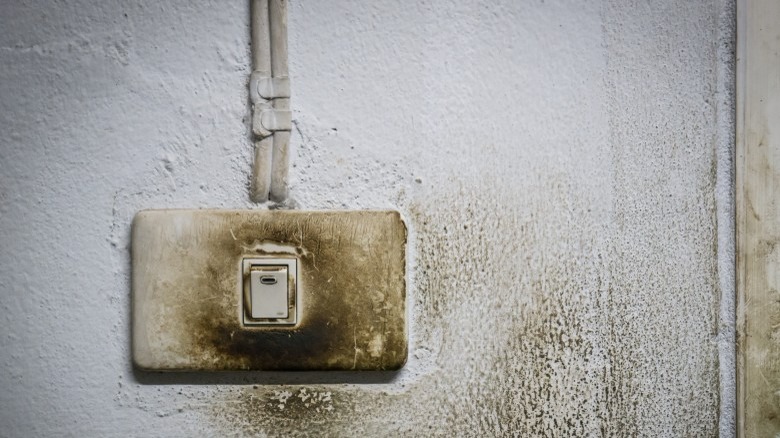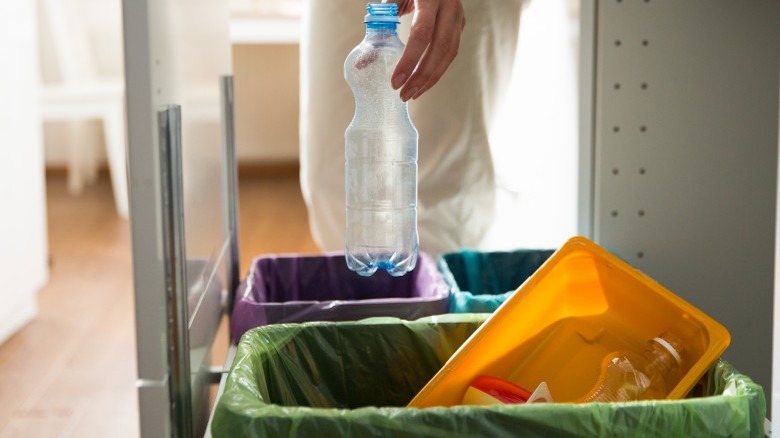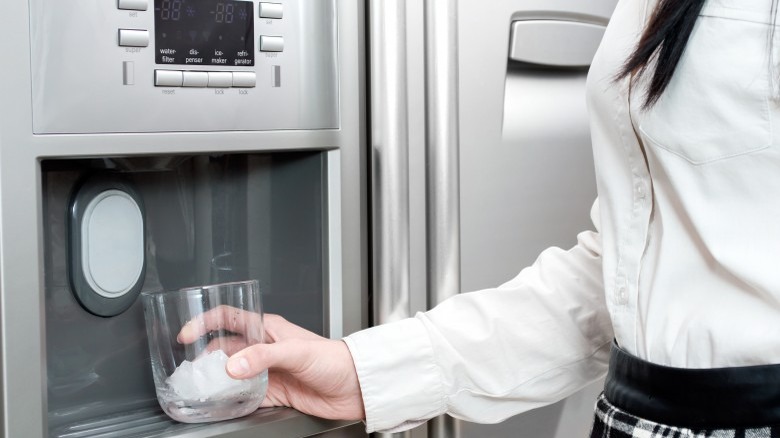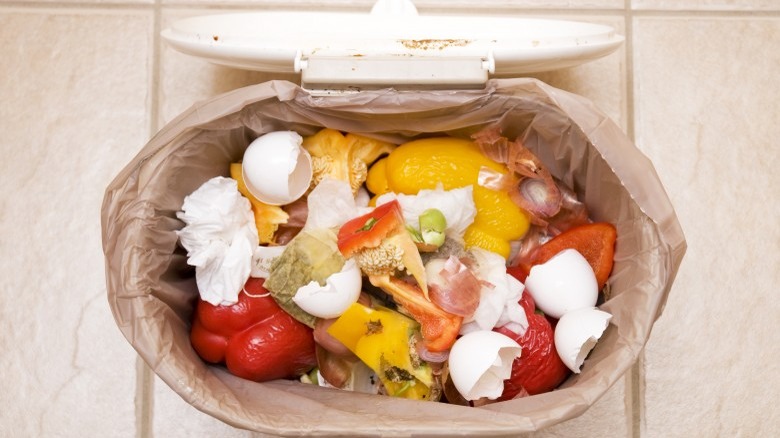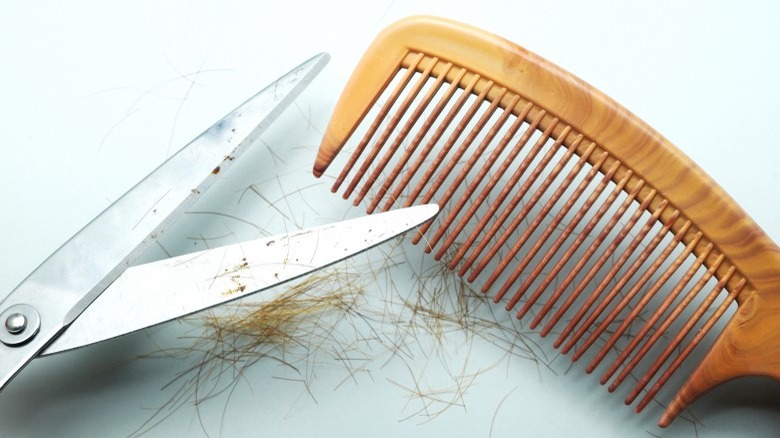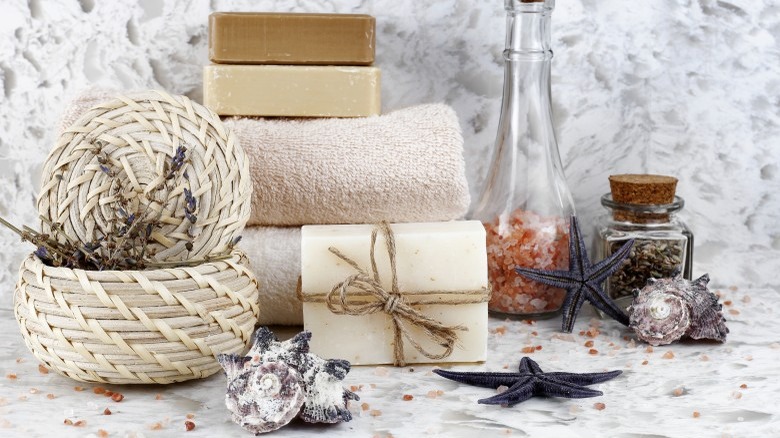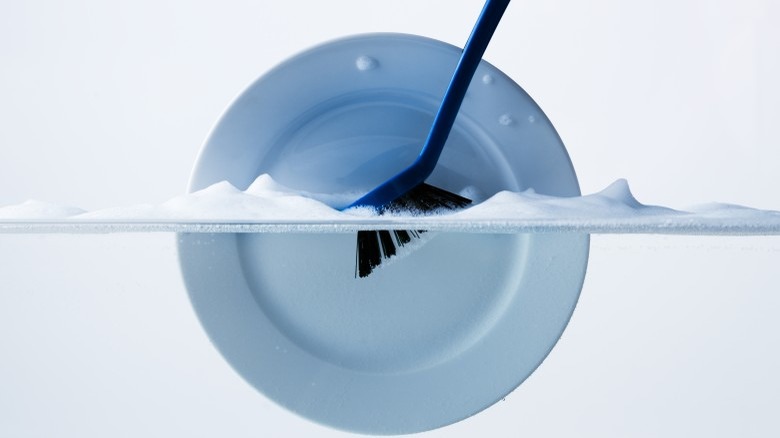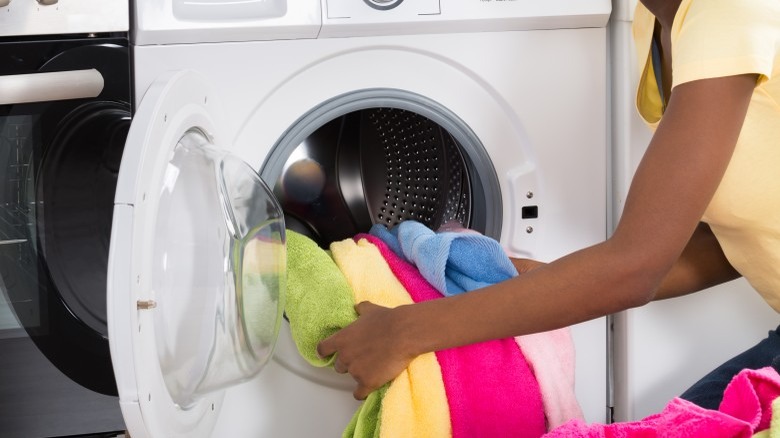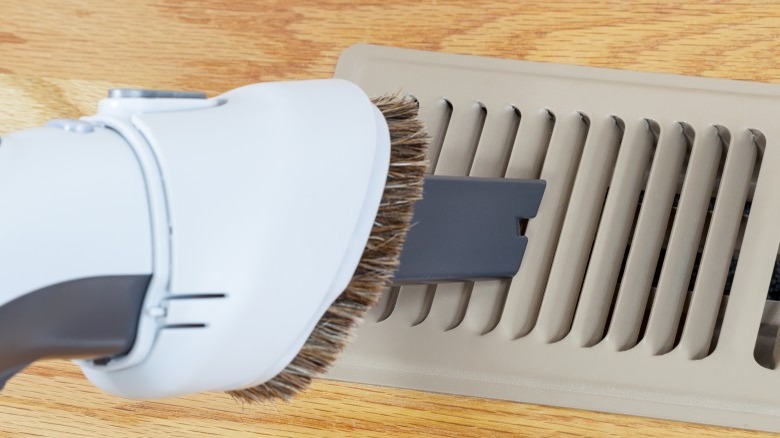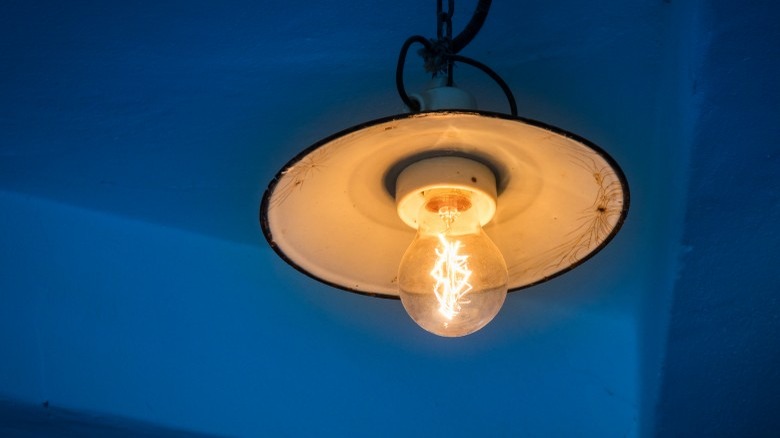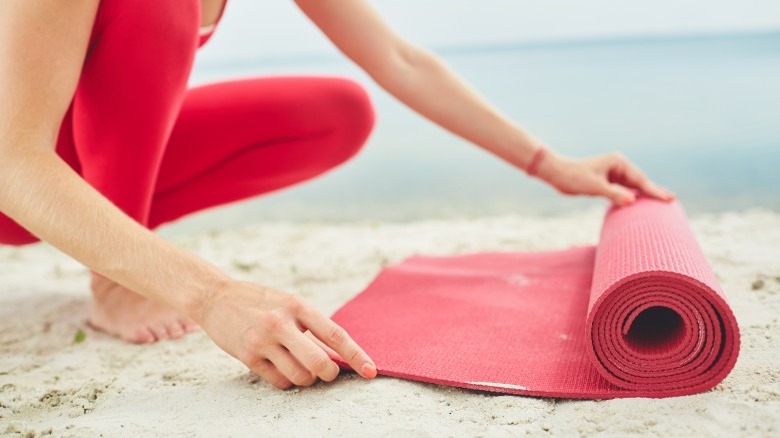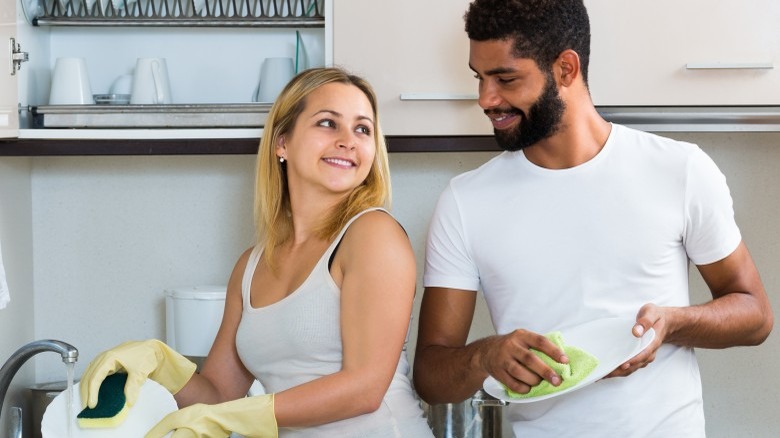Things In Your House You Should Be Cleaning But Aren't
We may receive a commission on purchases made from links.
Okay, ladies. I swear I'm not here to pile on, but if you're already a neat freak and finding new things to clean is fun for you, you should definitely check out our list of the most often overlooked places that need cleaning in your house. Or maybe you wish you were a neat freak, and a few extra tips on how to keep your home tidier than Mr. Clean's grandma's house could really benefit your progress.
Either way, we've targeted some spots that are definitely icky in your home. So don't be a "Josie Grossie" (love you, Drew Barrymore!) and get these areas handled.
Remote controls
Web MD reported on a University of Virginia study that "showed the remote control's surface is among the germiest" in a modern home. Researchers found that half of the remote controls tested were positive for cold viruses. Even if you're only snacking on veggies and hummus while you watch TV, instead of a messier snack like Cheetos, you're still definitely getting food particles on your remote. Or do you ever walk in the door and click on the TV without washing your hands first? Sure. Do you have little kiddos with icky hands or a messy roommate hanging around your living room?
There are a million common scenarios in which your remote collects germs and nastiness, and when is the last time you de-gunked it? A spritz of disinfectant, like Lysol, can do wonders here, as can a quick scrub between and over the buttons with a bleach wipe.
Light switches
I don't want to scare you, but the dirtiest spot in your home isn't your toilet seat. It's likely the light switches in the kitchen, bathrooms, and common spaces.
Unless you have one of those old '80s "clap on, clap off" hands free light devices, or a smart home system set up, then you are definitely spreading germs through touching your light switches. Healthline.com recommends wiping down all light switches with a disinfecting cloth once a week.
The wall behind the trash can
You don't always make a perfect shot straight into the trash can, do you? Sometimes it takes a bounce off the backstop, if you know what I mean. When garbage bounces off the rim of the can and hits the floor, you sweep, mop, or wipe, right? Well, don't forget to do the same to the wall behind the can, which can collect icky splatters and smears.
Inside your ice maker
You probably clean your fridge pretty regularly, and maybe even the inside of your freezer. But when is the last time you cleaned inside your ice maker? You get off easy if you just use manual ice trays, which can simply be thrown in the dishwasher between uses. But if you have a fancy freezer with an automatic ice maker, you're probably overdue for a refresher.
How can you tell if your system needs a good cleaning? If even its fresh ice looks cloudy, smells weird or stale, or starts to taste a bit funky, it's likely time to get in there and sanitize. The Housekeeping Channel recommends doing so at least twice per year.
Inside your coffee machine
Coffee is what keeps a lot of us going, but it isn't without fault when it comes to germs. Is your formerly stellar drip coffeemaker starting to turn out coffee that has a little funk in its flavor? You probably wash the pot every day, but do you ever clean the inside mechanics of your coffeemaker?
I don't want to startle you too badly, but a study of the "germiest" places in a home revealed that a "coffee maker reservoir" is the fifth most germ-laden place in a home. What can you do to disinfect yours? An expert for Good Housekeeping recommends taking off all the removable parts and hand washing or running them through the dishwasher. Then you can clean the reservoir with a mixture of water and white vinegar.
Inside trash cans
Leaked trash juice? Um, nope! Even if you always keep your trash cans covered with a bin liner or tall kitchen bag, germs and gunk will find a way. Nobody is suggesting you need to clean your trash cans every time you empty the bag, but periodically, it's necessary.
If you live in a house with an outside hose and a driveway, just take them outside, covering them inside and out with a cleaning solution (like Simple Green or bleach and water) and spray away. If you live in an apartment and can't really take the mess outside, take it into your shower or bathtub and apply the same spraying ritual (on a slightly smaller scale).
Hairbrushes and combs
Experts at Real Simple say that a brush properly cared for can last between one to three years. So what does "proper care" mean in this case? Removing hair manually after every use, washing by hand with shampoo and leaving it overnight to dry once a month, as well as cutting out any extra jammed-in-there hairs with scissors.
Bathroom decor
You know not to leave your toothbrush out in the open air of your bathroom counter. Why? Because super gross invisible particles from the flush of your toilet can spray all over surfaces in the bathroom, leaving anything out in the open totally vulnerable to a disgusting layer of germs.
Charles Gerba, Ph.D., Professor, Microbiology & Environmental Sciences, University of Arizona College of Public Health says (via Huffington Post) that bacteria and viruses "remain airborne long enough to settle on surfaces throughout the bathroom." Think about that little display of shells, fancy guest soaps, bath balms, or even that stack of what you thought were nice clean washcloths and towels just waiting for your guests to use them. So wipe down anything you can with disinfectant, and consider storing clean linens inside a cabinet if you don't want to wash them on the daily.
Dish brushes
You're probably already nuking your sponges in the microwave to kill bacteria and keep them cleaner for longer. And thank goodness, because that same University of Virginia study revealed that dish sponges and dish rags are usually the absolute "germiest" items in the home.
But what about dish brushes? Their plastic materials are not microwave-safe, and will definitely melt (trust me, don't try it). You should change them up and replace them regularly, but you can prolong each disposable brush's usefulness by giving them a frequent wash in the dishwasher. Just make sure to keep plastic brushes on the top rack to help avoid melting.
Your washing machine
Newer front-loading washing machines are generally more energy-efficient than older or top-loading models, but they come with a nasty surprise: they get moldy more often and more easily. That's why you might notice that your clothes have started smelling a bit mildewy even right after you've washed them.
Instead of resorting to Febreze, or highly scented dryer sheets to mask the smell, take a page out of "green cleaning" expert, Leslie Reichert's book, and give your washer a good cleansing every now and then. It's as easy running a cycle on the hottest water setting with nothing inside, using vinegar in place of liquid detergent.
Heater vents
The EPA recommends that air ducts be cleaned "as needed" in order to avoid unnecessary air pollution inside your home, and The National Air Duct Cleaners Association recommends "getting your air ducts cleaned every three to five years." But if you have forced air heater vents or wall units, you may need to clean them of dust much more often.
If you have radiated heat instead of forced air, you may have thought you could get away with skipping this little chore. Not this time! Make sure to give radiators a good wipe down with a moist cloth. Very dirty or dusty radiators can start fires. As heating equipment has been known to cause up to "15% of home fires and 13% of deaths."
Light bulbs
Yes, you read that right. Lightbulbs didn't used to be high on anyone's must-clean list, but here's the thing: it used to be that light bulbs would burn out and need replacing before they got dusty enough to be a real fire hazard.
But these old-fashioned light bulbs are on the outs, and the newer, cleaner, more energy-efficient and long-lasting LED models are taking over. LED light bulbs can last about six times longer than traditional electric bulbs, meaning a thick layer of dust can build up and become a fire hazard long before you think to check them.
Yoga and exercise mats
Think about how much sweat, oil and grime gets on your yoga mat during normal use, before you even think about hot yoga or Bikram classes. You roll that thing out onto strange floors, and if your yoga teacher is like mine, she won't mind jumping on your mat with her bare feet to show you some killer move — aaaannnnd then it's time to go facedown on the mat.
Sky Meltzer, CEO of Manduka, a major yoga mat retailer, says (via SafeBee) that you can wipe down your mat with a cloth and "equal parts water and apple cider vinegar in a spray bottle."
Pet toys
Do you kiss your pets on the mouth? I'm not here to judge (I love you, Penny the dog!). But if you're getting up close and personal with your dog's chew toys, and feeling safe in the 'common knowledge' that a dog's mouth is cleaner than that of a human, I'm gonna have to burst your bubble. Apparently, that myth was likely started when a 1990 study (via PubMed) "suggested that there may be some bacterial growth inhibition in dog saliva." It turned out that was not a consistent finding, but nevertheless, it could very well be the origin of the myth.
So basically, dogs don't have ultra-clean mouths like we'd always hoped they did, while licking our faces. Their chew toys are also just lousy with bacteria. Named as number four in the NSF International's "Germiest Places in the Home" study, pet toys should really be cleaned as often as you can manage it. Apartment Therapy recommends washing cloth or stuffed toys in a garment bag in your washing machine. For plastic or rubber toys, you should cover the holes with tape (so water doesn't get in and cause mold growth) and then, either soak and scrub in a mixture of white vinegar and water, or put them through a cycle in the top rack of your dishwasher. Just don't run them through at the same time as any items for human use.
Pick your battles
I promise, I'm not interested in making anyone feel more overwhelmed than they already are, about what's required to keep a clean house. These are really just tips for those of us who make cleanliness a hobby (or maybe an obsession) and want to make sure we're hip to the germiest areas in our homes.
But when it comes down to it, life is messy! So clean what you can, do as much as you have time for — and darlin', don't worry about the rest.
